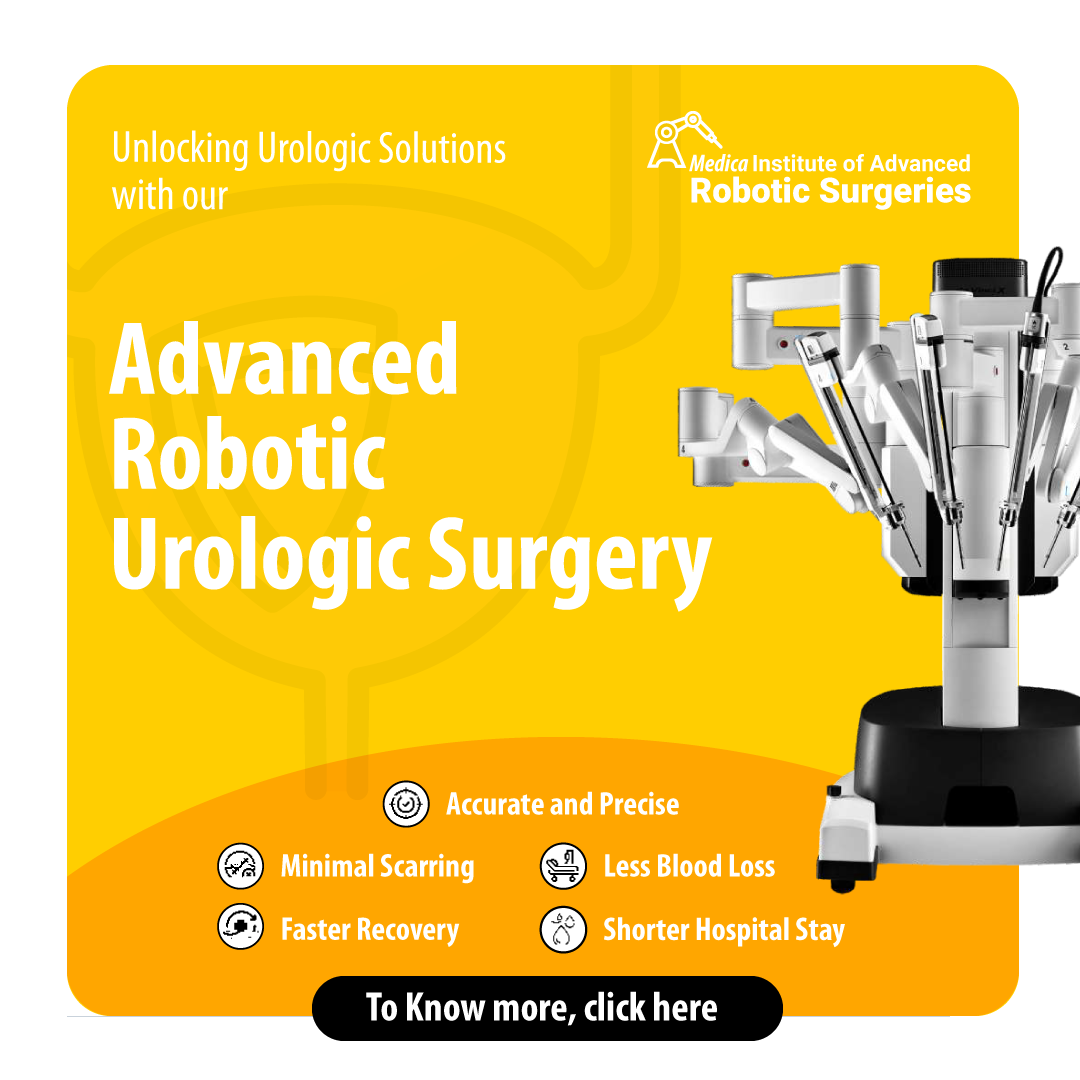Kidney failure (also known as renal failure) occurs when one or both kidneys are no longer able to operate properly on their own. Kidney failure can be transient and strike suddenly. Other times, it is a long-term ailment that worsens slowly over time. Kidney failure is a serious condition. Kidney failure is a serious condition. Treatments like dialysis and kidney transplants, on the other hand, allow many patients with impaired kidney function to enjoy full lives. Medica has state-of-the-art facilities and is one of the best dialysis centers in the entire eastern region. We also have modern medical equipment to perform complex surgeries like kidney transplantation and more.
Our team of urologists specialize in using these advanced technologies to perform sophisticated urological surgery at a reasonable cost. We have all the facilities of a world-class healthcare provider keeping in mind efficiency and patient safety.
What are Kidneys?
Kidneys are bean-shaped organs that are around the size of a fist. They’re tucked under your ribs and toward the back of your neck. Most people have two functioning kidneys, but as long as one of them is functioning properly, they can live happily.
Waste products build up in your body when your kidneys aren’t working properly. You may become ill if this occurs. Kidney failure can be life-threatening in the most serious cases. However, with the correct medicine, many patients can manage renal failure.
Free Doctor Assessment
Types of Renal Failure
Acute and chronic renal failure are the two main kinds of kidney failure.
Acute renal failure develops suddenly and may be reversible.
Chronic renal failure develops gradually over at least three months and can lead to kidney failure that is permanent.
Symptoms of Renal Failure
Acute Kidney Failure Symptoms: Symptoms of acute kidney failure often depend on the underlying condition. Symptoms may include:
- Hemorrhage (unusual bleeding)
- Fever
- Weakness
- Fatigue
- Rash
- Diarrhea or bloody diarrhea
- Poor appetite
- Vomiting
- Abdominal pain
- Back pain
- Muscle cramps
- No urine output
- Frequent urination
- Pale skin
- Nosebleeds
- Swelling or puffiness
- Eye inflammation
- An abdominal mass you can feel
Chronic Kidney Failure Symptoms: Many persons with renal disease have little or no symptoms in the early stages. It’s crucial to remember that even if you feel great, chronic kidney disease can still cause damage.
Distinct people have different symptoms as a result of chronic kidney disease and renal failure. You may notice one or more of the following symptoms if your kidneys aren’t operating properly:
- Poor appetite
- Vomiting
- Muscle cramps
- Headache
- Insomnia
- Itchy/dry skin
- Urine problems
- Recurrent urinary tract infections
- Urinary incontinence
- Pale skin
- Smelly breath
- Trouble hearing
- An abdominal mass you can feel
- Tissue swelling
- Poor muscle tone
- Change in mental alertness
- Metallic taste in mouth
Causes of Renal Failure
Kidney failure occurs when 85-90 percent of your kidney function has been lost, and your kidneys are no longer able to keep you alive. There is no cure for renal failure, but with therapy, it is possible to live a long life. Renal disease is not a death sentence, and persons with kidney failure can still live active lives and pursue their passions. Kidney failure is most commonly caused by high blood pressure and diabetes. They can also be harmed as a result of physical trauma, illnesses, or other conditions. However, kidney failure might strike suddenly due to an unanticipated cause.
Acute renal failure occurs when the kidneys lose function suddenly (within hours or days) (or acute kidney injury). Kidney failure of this type is usually only transient. Acute renal failure can be caused by a variety of factors, including:
- Kidney autoimmune disorders
- Certain medication
- Dehydration can be a serious problem
- An blockage in the urinary tract
- Heart and liver disease are examples of uncontrolled systemic diseases
Chronic renal disease can also be caused by the following factors:
- Cysts (fluid-filled sacs) build inside your kidneys in polycystic kidney disease, a hereditary disorder
- Glomerular disorders limit the kidneys’ ability to filter waste, such as glomerulonephritis
- Lupus and other autoimmune illnesses can have a wide range of effects on the body
In India, there are roughly 7.85 million persons who suffer from chronic renal failure
Seek help from an expert
Call NowKidney Failure Diagnosis Procedures
A physical examination and questions about your medical history are used to make the diagnosis. Please let our doctors know if you’ve been having any symptoms.
Other diagnostic tests include the following:
- Blood test
- Urine test or Urinalysis
- Chest X-ray
- ECG
- Bone scan
- Ultrasound
- Kidney biopsy
Kidney Transplant: Kidney transplant surgery involves doctors implanting a healthy kidney into your body to replace your damaged organs. This healthy kidney, known as a donor organ, can come from either a deceased or living donor, such as a friend or family member. With just one healthy kidney, people can live happily. Kidney transplant surgery involves doctors implanting a healthy kidney into your body to replace your damaged organs. This healthy kidney, known as a donor organ, can come from either a deceased or living donor, such as a friend or family member. With just one healthy kidney, people can live happily.

Minimally Invasive
Surgery

World Renowned
Experts
EMI Facility
Available

Covid Safe
Environment
Treatment
Treatment for kidney failure is influenced by the nature and severity of the problem. Kidney disease can be slowed down by treating a chronic medical condition. Our doctor may use one or more measures to monitor your health if your kidneys begin to lose their functionality gradually. Our doctor can help you keep your kidneys functioning as long as possible by keeping a careful eye on you. People with renal failure require treatment to stay alive because the kidneys serve such a crucial function. The following are the most common therapies for renal failure:
Dialysis: It is a treatment that assists the body in filtering the blood (doing the job that the kidneys can no longer perform).
- Hemodialysis is a procedure in which a machine cleans your blood on a regular basis. This renal failure medication is usually given three or four times a week at a hospital or dialysis center.
- Peritoneal dialysis uses a catheter and a dialysis solution to clean the blood in a somewhat different way. People can sometimes complete their treatment at home.
Kidney Transplant: Kidney transplant surgery involves doctors implanting a healthy kidney into your body to replace your damaged organs. This healthy kidney, known as a donor organ, can come from either a deceased or living donor, such as a friend or family member. With just one healthy kidney, people can live happily. Kidney transplant surgery involves doctors implanting a healthy kidney into your body to replace your damaged organs. This healthy kidney, known as a donor organ, can come from either a deceased or living donor, such as a friend or family member. With just one healthy kidney, people can live happily.









